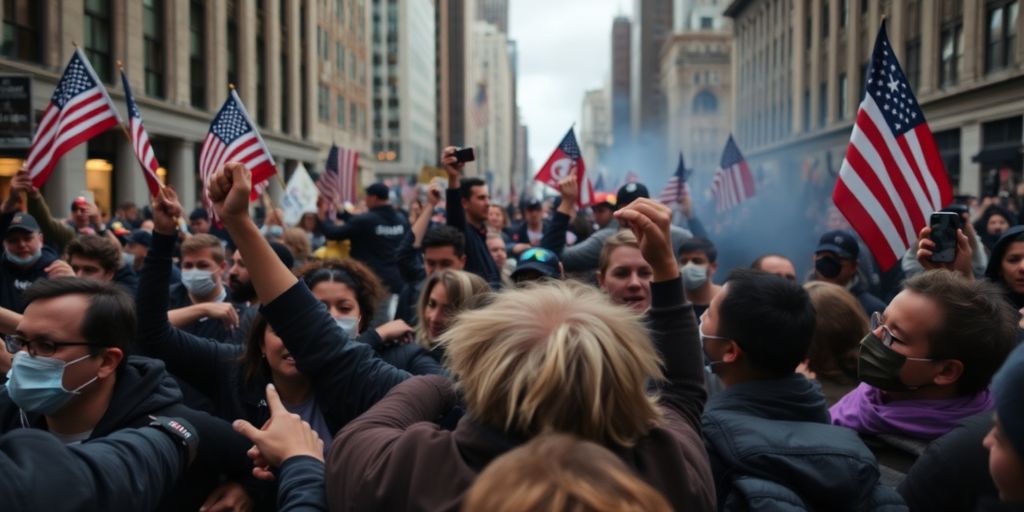Politics
Escalating Political Violence: A Growing Concern in the U.S.

Political violence in the United States has surged alarmingly, with recent incidents highlighting a troubling trend. From attacks on political figures to violent protests, the fabric of American democracy is being tested as calls for an end to this violence grow louder.
Key Takeaways
- Recent incidents of political violence include attacks on public officials and political party headquarters.
- Pennsylvania Governor Josh Shapiro’s home was targeted, prompting urgent calls for action against political violence.
- The rise in violent acts is attributed to increasing polarization and extremist ideologies.
Recent Incidents of Political Violence
The recent attack on Pennsylvania Governor Josh Shapiro’s residence, where a man broke in and set the mansion on fire, underscores the escalating nature of political violence. Shapiro condemned the act, stating, "This kind of violence is becoming far too common in our society. And I don’t give a damn if it’s coming from one particular side or the other. It has to stop."
This incident is part of a broader pattern of political violence that has emerged in recent years, including:
- Assassination Attempts: Former President Donald Trump has faced multiple assassination attempts, including a shooting at a campaign rally that resulted in the death of a supporter.
- Attacks on Political Headquarters: The New Mexico Republican Party headquarters was set ablaze, with incendiary materials found at the scene, while the Democratic National Committee office in Arizona was shot at multiple times.
- Violence Against Public Figures: High-profile attacks, such as the hammer assault on Nancy Pelosi’s husband, have raised alarms about the safety of political leaders.
The Impact of Political Polarization
The rise in political violence is often linked to increasing polarization within the country. Extremist groups and individuals are more likely to resort to violence as they feel their beliefs are under threat. This environment fosters a culture where political disagreements can escalate into violent confrontations.
Notable Cases of Political Violence
Several high-profile cases illustrate the severity of this issue:
- Capitol Riot (January 6, 2021): An unprecedented attack on the U.S. Capitol by extremist groups protesting the 2020 election results.
- Plot to Kidnap Michigan Governor: In 2020, anti-government extremists were arrested for plotting to kidnap Governor Gretchen Whitmer, showcasing the lengths to which some will go to express their dissent.
- Shooting at Republican Baseball Practice (2017): A gunman opened fire on Republican lawmakers, critically injuring Rep. Steve Scalise, driven by animosity towards the GOP.
Calls for Action
In light of these events, political leaders and citizens alike are calling for a concerted effort to address the root causes of political violence. Governor Shapiro’s plea for an end to violence resonates with many who fear for the future of democratic discourse in the U.S.
As the nation grapples with these challenges, it is crucial for communities to engage in dialogue and seek peaceful resolutions to political disagreements. The safety of public officials and the integrity of democratic processes depend on it.
Sources
-

 Press Release4 days ago
Press Release4 days agoClinical Trials Market Set for Robust Growth, Driven by Drug Development Surge and Digital Innovation
-

 Press Release5 days ago
Press Release5 days agoFill-Finish Pharmaceutical Contract Manufacturing Market Expected to Flourish Amid Biopharmaceutical Boom and Global Outsourcing Trend by 2035
-

 Business6 days ago
Business6 days agoHow Managed IT Solutions Help Small Teams Compete at Enterprise Scale
-

 Press Release5 days ago
Press Release5 days agoGreen Bio Chemicals Market Poised for Sustainable Growth amidst Global Shift to Eco-Friendly Alternatives by 2035
-

 Press Release5 days ago
Press Release5 days agoIndustrial Boiler Market Expected to Surpass USD 24.4 Billion by 2035 Amid Growing Demand for Energy Efficiency and Industrialization
-

 Press Release5 days ago
Press Release5 days agoPreventive Vaccines Market to Witness Strong Growth by 2035
-

 Press Release5 days ago
Press Release5 days agoPet Food Nutraceutical Market Set for Robust Expansion Amid Rising Demand for Pet Wellness by 2035
-

 Press Release4 days ago
Press Release4 days agoWaterproof Structural Adhesives Market: A Comprehensive Study Towards USD 10.3 Billion in 2035










